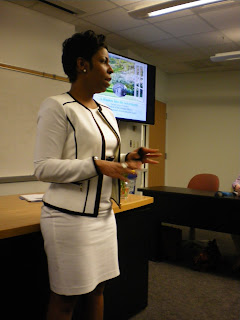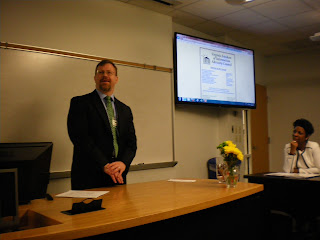by Donna Bausch
Presenters: Natalie Womack, DEQ FOIA Officer
Alan Gernhardt, Senior Attorney, Virginia FOIA Council
Natalie Womack came to the Virginia Department of Environmental Quality (DEQ) after three years at the Federal Bureau of Investigation. She contrasted FOIA procedure at the federal and state level. In Virginia, response is far timelier than at the federal level, and the commitment is to be as responsive as possible in releasing all requested information permissible by law.
(Photo of Natalie Womack by Fred Dingledy)
What is DEQ? The Department resulted from the 1992 merger of the Air, Water and Waste Boards. DEQ’s mission is to protect the health and well-being of the citizens of Virginia.
Womack wants FOIA requesters to keep in mind that a “no record” response may mean either that 1) a record never existed or 2) that the record once existed but no longer exists, due to Public Records Act retention policy limitations.
There is a 5 day response timeline, which can be extended another 7 days with adequate agency justification.
FOIA provides access both to public records and to public meetings. Womack focuses on the records side.
All items are “records” – if they are in agency possession, stored or owned, regardless of physical form; “letters, numbers or words” relating to the business of the agency.
FOIA requests can be made in person, by mail or email. The DEQ website includes a video Womack narrates instructing requesters how to prepare requests.
Be as specific as possible in your request. Include any potentially relevant information which can narrow the search. Limit the request to a specific time frame. Fishing expeditions can be expensive.
DEQ is philosophically inclined to provide requesters with anything relevant. But keep in mind that the FOIA Officer is a FOIA expert, rather than a scientist or subject matter expert!
Most importantly, Womack provided her direct contact information:
804-698-4085
If all FOIA officers are as charming, funny and dedicated to their work as Womack, our tax dollars are well spent.
Alan Gernhardt has done this type of work since 2004, and it shows. He showed a facility with the subject matter and familiarity with the complex issues which result that was truly impressive and laced his presentation with humor and memorable war stories.
He posited that FOIA policy attempts to put the lofty ideal of “informed” consent of the governed into practical effect.
(Photo of Alan Gernhardt by Fred Dingledy)
The general rule is that all public records are open unless they fall within one of the 150 records and meetings exemptions, which are quite specific. (For example, one exempts release of the subscriber list of a state agency produced wildlife magazine.)
FOIA is not intended to be an adversarial process. Clarity of communication is often the issue.
Gernhardt walked us through the Council’s extensive web resources.
Useful forms and sample letters are included, including court forms. Advisory Opinions of the FOIA Council are searchable. Also see the Coalition for Open Government site which gathers Advisory Opinions by topic.
Regarding costs, public bodies are encouraged to price the cost of providing a “page” of records and publishing this so that requesters can plan accordingly. Reasonable charges/actual costs are permissible. Actual costs can be shockingly high. For example, it can cost $1000 per employee for a month’s worth of email “data dump”. Hence the wisdom of carefully targeting the request as to time period and persons to whom the request should apply.
Agencies may charge for the time it takes for redaction search and execution. Some recent Port Authority requests, for example, have cost requesters upwards of $200K.
Gernhardt joked that an example of an ideal FOIA transaction is a bus rider asking a bus driver for the bus route schedule and being handed one. Quick,free and complete.
Although this summary barely scratches the surface of the valuable information shared by these experts, rest assured that our time was well spent in this session and that we have a better understanding of the complexity of FOIA in action and an appreciation for the work of individuals tasked with responding to FOIA requests.


